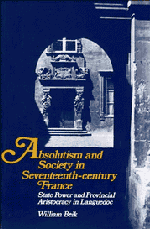 Absolutism and Society in Seventeenth-Century France
Absolutism and Society in Seventeenth-Century France Book contents
- Frontmatter
- Contents
- List of tables
- List of figures
- Preface
- List of abbreviations
- Map: Languedoc in the seventeenth century
- PART ONE INTRODUCTION
- PART TWO THE DISTRIBUTION OF AUTHORITY
- PART THREE THE PROVINCE ON ITS OWN
- PART FOUR THE PROVINCE AND THE CROWN
- 10 Channels of personal influence
- 11 Tax flows and society
- 12 Collaborating with the king: positive results and fulfilled ambitions
- 13 Basking in the sun: the triumph of authority and hierarchy
- Conclusion
- Appendix: Breakdown of taxes from the diocese of Toulouse, 1677
- Select bibliography
- Index
13 - Basking in the sun: the triumph of authority and hierarchy
Published online by Cambridge University Press: 05 July 2011
- Frontmatter
- Contents
- List of tables
- List of figures
- Preface
- List of abbreviations
- Map: Languedoc in the seventeenth century
- PART ONE INTRODUCTION
- PART TWO THE DISTRIBUTION OF AUTHORITY
- PART THREE THE PROVINCE ON ITS OWN
- PART FOUR THE PROVINCE AND THE CROWN
- 10 Channels of personal influence
- 11 Tax flows and society
- 12 Collaborating with the king: positive results and fulfilled ambitions
- 13 Basking in the sun: the triumph of authority and hierarchy
- Conclusion
- Appendix: Breakdown of taxes from the diocese of Toulouse, 1677
- Select bibliography
- Index
Summary
We have seen that one aspect of Louis XIV's success in winning the loyalty of the rulers of Languedoc was the popularity of the programs he carried out. The various agencies, especially the Estates, were swept up in activities which satisfied deep-felt needs and fulfilled many ambitions. There were advantages to participating in the successful regulation of troops, the measuring and embellishing of waterways, the suppression of Protestants. The provincial authorities were also becoming integrated into a larger, more unified network of personal contacts leading to the king, and their opportunities for taking advantage of the profits of state finance were greatly expanded. But these elements of a larger, more effective government do not tell the whole story. The reason for the adulation and conformity lay deeper than particular administrative achievements which, after all, had their disadvantages as well as their attractions. They lay in the very nature of absolutism as a system which protected the rank and hierarchy of a class of advantageously placed landowner-officers and in Louis's ability to reinforce these relationships.
The king's particular genius lay in his capacity for personifying traditional relationships while making them work through improved coordination. More specifically, his success can be analyzed in terms of three techniques, each of which was a skillful new utilization of age-old resources. First was the transmission through newly-expanded bureaucratic channels of the classic absolutist message that obedience to a personal sovereign should be unlimited.
- Type
- Chapter
- Information
- Absolutism and Society in Seventeenth-Century FranceState Power and Provincial Aristocracy in Languedoc, pp. 303 - 328Publisher: Cambridge University PressPrint publication year: 1985
